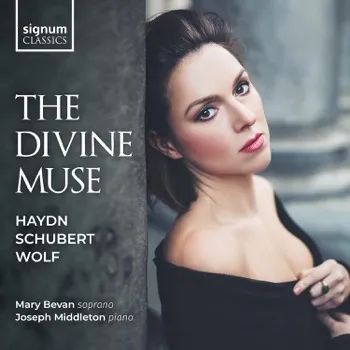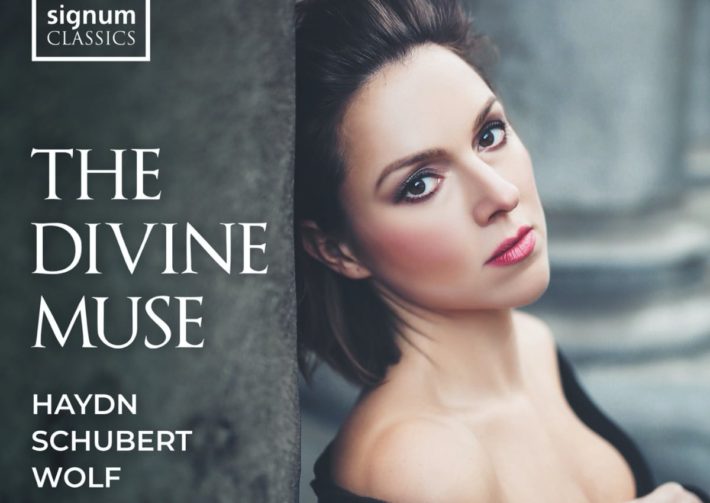Soprano Mary Bevan and Joseph Middleton’s first album together, “Voyages,” indulged in various earthly fantasies, mostly from poets Baudelaire and Goethe, with great success. Here they turn to divinity for inspiration, both Grecian and Christian, and find a bit more peril along the way. This recital is sometimes stormy, sometimes prayerful, and occasionally full of rapture.

In a clever conceit, the three opening Schubert songs foreshadow the rest of the album both artistically and thematically. Bevan is a dynamic Dido in the first, alternating between loving and desperate as she tries to convince an imagined Aeneas to stay with her. This previews the conflict of Haydn’s longer cantata “Arianna à Naxos,” but also introduces Bevan’s skilful operatic vocals and Middleton’s sensitivity. Together, they capture Dido’s shift from outward, tender plea (“Do not leave me, my beloved”) to simultaneous inner panic (“I would die taking leave of you”). In the second track, Bevan is a frazzled Venus whose vibrato doesn’t let up for a moment. Even the pauses seem to vibrate with nervous energy, and this ends up contrasting wonderfully with later, non-vibrato moments. In the third track, Schubert’s nostalgic “Die Götter Griechenlands,” we get prayerful sorrow and joy intermingled, contradictions that are critical to the nine Hugo Wolf songs that follow.
Indeed, in the two of Wolf’s “Mörike Lieder” that follow, there is a wonderful uncertainty in the performance. It’s difficult to fully embrace words of praise like “Zum neuen Jahr” from Mörike, a priest who struggled to keep his passions in check (as Richard Stokes explains in the brilliant liner essay), knowing that he just as freely wrote of how his failure to keep the faith caused him “hellish pain” in “Seufzer.” In “Zum neuen Jahr,” a faster tempo than most, relatively mellow bell-effects from Middleton and gentler diction from Bevan, leave space for that dichotomy. In “Seufzen,” Middleton’s minor ninths which toil so hard to resolve, only to go the “wrong” way, and the sudden appearance of Bevan’s non-vibrato, evoke an exhausted, entirely unadorned suffering that gets right to the heart of Mörike’s text. It is not an all-out, “Dies Irae” or “Stabat Mater” kind of pain, but an introverted, wavering kind.
Schubert’s “Ganymed” serves as a refreshing interlude after the Wolf. This is one of the few unadulterated songs of joy on the album, even if, as pointed out by Stokes, Schubert misses the point of the poem. Listen to Bevan’s indulgent legato as she sings “Unendliche Schöne” (“unending beauty”), and Middleton’s innocent, joyful right-hand. What bliss!
In the album’s centerpiece, Haydn’s “Arianna à Naxos,” that bliss proves short-lived as Ariadne discovers that her lover, Theseus, whom she had just saved from the minotaur, has abandoned her on an island. One thinks of arias as the main coin of cantatas, but here the recitatives do the most interesting work. In the first recitative, Bevan hits each emotional and dramatic mark precisely, calmly waking from a dream, teasing Theseus (“I shall offer a more welcome pray for your snares”), and then more urgently calling to him. In the second, as Ariadne discovers her fate, Bevan works up a frenzy which quickly shifts to righteous anger and finally sadness. When the anger returns in the final aria, it’s a tour de force from Bevan as she traverses her full range and turns up the vibrato. One notes in particular that Bevan’s vibrato never distorts her voice’s pitch, which allows even the most emotionally charged moments to be fully accurate.
In the final third of the album, three settings about the Virgin Mary stand out, Schubert’s “Marie” and Wolf’s “Auf ein altes Bild” and “Die ihr schwebet.” Schubert’s song is both a hymn and a love song (as astutely noted again by Stokes in the booklet), and Bevan practically sings this dual meaning into existence. The tempo is square enough for a hymn, but her gentle vibrato, her ever-so-slightly-luxurious consonants at the beginnings of words, hint at the sweetness beneath the text. In the first Wolf, Mörike’s text depicts a painting of a serene Mother and Child by some trees, but frets that “already the wood for the cross” is growing amongst them. Wolf’s setting uses a single, lonely piano motif throughout, metaphorically the frame for the singer’s painting. Middleton’s pedal-isolated chords are perfectly frame-like, proportioned just so but unobtrusive, and Bevan’s tone is “simplice” without being monotonous. It feels as if the only thing in the world is this painting. In the second Wolf, the duo conjures up the storm above Bethlehem, but doesn’t miss the magic of the baby Jesus asleep in Mary’s arms.
The recording quality on the album is outstanding, save an intermittent, just-noticeable buzzing when Bevan hits some of her high notes (perhaps from a microphone). Recorded in the same London church as “Voyages,” it has the same airy quality without any hint of the sometimes overly-resonant “empty church” acoustic. For the variety of colors, outstanding drama, and emotive singing, this is a highly recommended recital.
“The Divine Muse” – Songs by Haydn, Schubert and Wolf
Mary Bevan – Soprano
Joseph Middleton – Piano
Signum Classics, CD SIGCD606




















